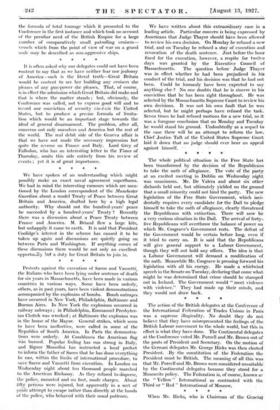We have written about this extraordinary case in a leading
article. Particular concern is' being expressed by Americans that Judge Thayer should have been allowed to review his own decision. On Monday he refused a new trial, and on Tuesday he refused a stay of execution and revocation of the death sentence. Just before the hour fixed for the execution, however, a respite for twelve days was granted by the Executive Council of Massachusetts. The question before • Judge • Thayer was in effect whether he had been prejudiced in his conduct of the trial, and his decision was that he had not been. Could he humanly have been expected to say anything else ? No one doubts that he is sincere in his conviction that he has been right throughout. He was selected by the Massachusetts Supreme Court to'reVietkibis own decisions. It was not his own fault that he was selected, but he might perhaps have refused the task. Seven times lie had refused motions fora new trial, So' it was a foregone conclusion that on Monday and Tuesday he would stand his ground. Undoubtedly as a sequel to the case there will be an attempt to reform the law: Chief Justice. Taft of the United States Supreme -Court laid it down that no judge should ever hear an appeal against himself. - • * • *






























 Previous page
Previous page